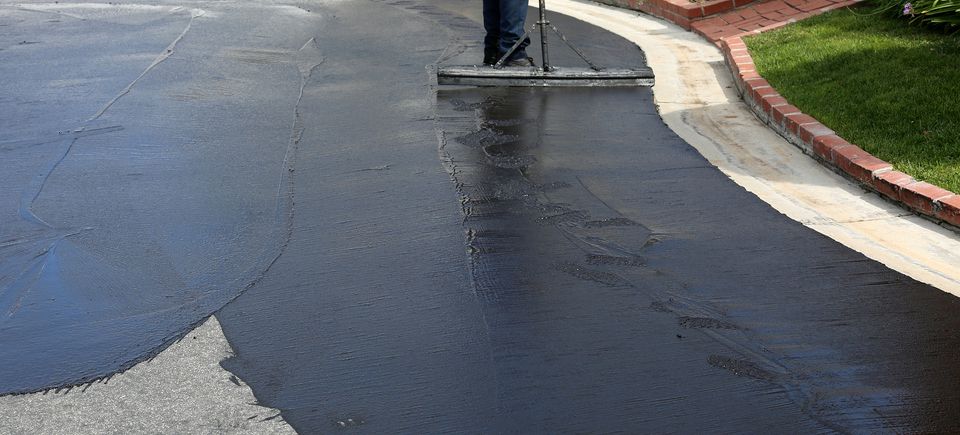Seal in Quality: Expert Solutions for Asphalt Repair and Sealing
Seal in Quality: Expert Solutions for Asphalt Repair and Sealing
Blog Article
Cold Mix Asphalt Vs. Hot Mix Asphalt: Which Is Right for You?

Structure Differences
Cold mix and hot mix asphalts differ considerably in their composition, with distinct qualities that affect their performance and applications. Cold mix asphalt is produced by emulsifying the asphalt binder with water and an emulsifying representative before blending it with aggregate. This technique permits for the asphalt to be workable at lower temperature levels, making it excellent for temporary repair services and for usage in cooler climate condition. Warm mix asphalt, on the various other hand, is produced at heats, typically between 300-350 ° F, which assists to attain better compaction and a more sturdy final product. The hot mix asphalt production process involves warming the accumulation and asphalt binder separately prior to integrating them at the asphalt plant.
Moreover, cool mix asphalt has a tendency to be much less thick and a lot more flexible than warm mix asphalt. This adaptability makes it far better fit for locations with higher levels of activity, such as driveways or roadways with hefty traffic. In comparison, hot mix asphalt is understood for its high resilience and resistance to rutting and fracturing, making it a preferred option for freeways and high-traffic roadways where longevity is important.
Setup Process Variations
The process of mounting cool mix and warm mix asphalt exhibits noteworthy variances in their demands and treatments. In contrast, warm mix asphalt demands an extra intricate installment procedure. Due to the heating demands, hot mix asphalt installments are commonly brought out by professionals with specific devices, ensuring a more long-term and structurally sound outcome.
Toughness and Longevity Aspects
When taking into consideration asphalt choices, sturdiness and long life are crucial variables to examine for enduring sidewalk efficiency. Hot mix asphalt (HMA) is understood for its phenomenal toughness and long life. The heats throughout the blending and laying process permit much better compaction, causing a denser and more powerful sidewalk structure. This brings about HMA being extra resistant to heavy web traffic loads, rough weather, and the impacts old compared to cold mix asphalt (CMA)
In regards to longevity, HMA generally outmatches CMA because of its superior stamina and resistance residential properties. HMA pavements have a longer service life, calling for less frequent repairs and maintenance, which can convert to set you back savings over time. Furthermore, HMA sidewalks are much more easily personalized to fulfill certain project requirements, better enhancing their toughness.
Expense Considerations
Taking into consideration the financial effects is a vital aspect when examining the selection between warm mix asphalt (HMA) and chilly mix asphalt (CMA) for pavement tasks. While view publisher site the preliminary cost of warm mix asphalt is typically higher than that of cool mix asphalt, HMA typically gives a more economical remedy in the lengthy run due to its exceptional toughness and longevity.
Along with material expenses, it's necessary to take into consideration the costs connected with installment and maintenance when contrasting HMA and CMA. HMA generally calls for specific devices and proficient labor for appropriate installment, which can impact general job prices. Alternatively, CMA is less complicated to deal with and can commonly be applied utilizing easier methods, possibly decreasing setup expenses. Eventually, the decision in between HMA and CMA must take into consideration not just the preliminary expense yet likewise the long-lasting financial effects to determine one of the most cost-effective option for the certain sidewalk job.
Environmental Impact Contrast
Comparison of the environmental influences in between warm mix asphalt (HMA) and cold mix asphalt (CMA) exposes unique distinctions in sustainability techniques. HMA manufacturing needs high temperature levels, causing increased energy usage and greenhouse gas discharges. The procedure additionally releases unpredictable organic compounds (VOCs) and harmful air toxins (HAPs) right into the atmosphere. In contrast, CMA is generated and used at reduced temperature levels, reducing energy usage and exhausts substantially. The reduced manufacturing temperature levels of CMA cause lowered gas usage and lower degrees of CO2 exhausts, making it a much more ecologically friendly alternative.
Additionally, making use of CMA frequently entails recycling Get More Information existing asphalt sidewalk, advertising resource preservation and lowering the amount of waste sent to landfills. This reusing facet further boosts the sustainability of CMA compared to HMA. Generally, when thinking about the environmental effect, CMA arises as a more environmentally sustainable selection as a result of its lower power requirements, lowered emissions, and the possibility for reusing existing products. By choosing CMA over HMA, roadway building and construction jobs can contribute favorably to environmental preservation initiatives.
Verdict
Finally, the option between cool mix asphalt (CMA) and warm mix asphalt (HMA) relies on various aspects such as composition, installation procedure, durability, long life, expense, and ecological impact. asphalt repair. While CMA provides a quick and economical remedy for minor fixings, HMA makes certain superior longevity and longevity for heavy traffic areas. Think about these aspects thoroughly to identify which kind of asphalt is the right choice for your paving needs

Thinking about the monetary effects is a critical aspect when evaluating the choice in between warm mix asphalt (HMA) and chilly mix asphalt (CMA) for pavement jobs. While the initial expense of hot mix asphalt is commonly higher than that of chilly mix asphalt, HMA commonly offers a much more economical option in the long run due to its exceptional sturdiness and longevity. cold mix asphalt.Contrast of the environmental effects in between hot mix asphalt (HMA) and cool mix asphalt (CMA) exposes distinct differences in sustainability techniques.In verdict, the choice between chilly mix asphalt (CMA) and that site warm mix asphalt (HMA) depends on various factors such as composition, setup process, durability, long life, cost, and environmental impact
Report this page